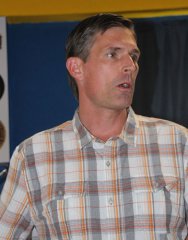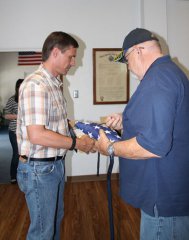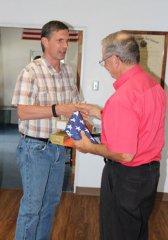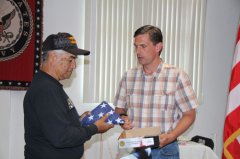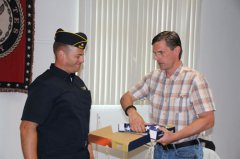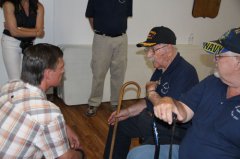Photos and article by Mary Alice Murphy
Heinrich makes presentations at American Legion 070417
Heinrich makes presentations at American Legion 070417
U.S. Senator Martin Heinrich talks to veterans at American Legion Post 18
Heinrich makes presentations at American Legion 070417
Heinrich presents flag that flew over the national Capitol to Tom Raines, American Legion Post 18 commander
Heinrich makes presentations at American Legion 070417
Heinrich gives a flag that flew over the Capital to Frank Donohue of the Marine Corps League Detachment 1328
Heinrich makes presentations at American Legion 070417
Armando Amador, president of the Vietnam Veterans of America Chapter 358, received a flag from Heinrich
Heinrich makes presentations at American Legion 070417
John Tetford of the Disabled Veterans of America receives a flag from Heinrich
Heinrich makes presentations at American Legion 070417
Heinrich talks one-on-one to World War II veteran Bill Harrison
Congressman Steve Pearce and U.S. Senator Martin Heinrich participated in the Silver City Fourth of July parade.
Before the parade, the Beat had a few minutes to catch up with Congressman Pearce.
He noted that even if the Senate passes its version of the health care reform act, which has some similarities to the House Bill that was approved, because of differences it would have to go through Conference Committee to sort out and compromise on the changes before it could be sent to President Trump to sign.
As for tax reform, Pearce said that most people think that health care reform has to go through first, because that is where the savings for tax reform would be found. "We're saying to move ahead with tax reform, because the middle class needs a tax break."
Pearce said he is not a dealmaker and doesn't want to be. "We get in fights to support the people of this country, not someone's agenda."
He doesn't always vote with the Republican Party, he said, because he wants to vote for his constituents. "I reach across the aisle."
As the chairman of the Terrorism and Illicit Funding Committee, he said the committee has to address fast moving changes. "We are doing a lot of work."
Later in the day, after lunch, Sen. Heinrich attended a meeting for veterans at the American Legion Allingham-Golding oftenPost 18 building on College Avenue.
American Legion Post 18 member Ray Davis introduced Heinrich and said he was there to talk about veterans' issues. He noted the American Legion is about to celebrate its 100th birthday. "We represent all services to our country. One thing we are concerned about is to have a 100th Commemoration Medal. We are also concerned about transportation to the V.A. Hospital in Albuquerque. We need a new van. It has 307,000 miles on it. If a flight to Albuquerque works for you, that is also an option."
Heinrich said: "On Independence Day, it's important to say thank you to all who have served. I have the honor to serve on the Armed Services Committee. We just passed the Armed Services Appropriation bill out of committee on a unanimous vote. I am not on the Veterans Committee, but Kristen can be your point person in Southwest New Mexico. Don't be shy about putting us to work."
He noted that often, the sacrifices by veterans are obvious, but sometimes they don't show up until 40 years later. "The check you write needs to be honored."
Frank Donohue of the Marine Corps League and the American Legion said he won't use the Choice Card. "In New Mexico, it's a no-no to go for treatment to the V.A. hospital in Tucson. It takes three hours and 15 minutes to go to Tucson and almost five hours to Albuquerque."
Heinrich said the Choice Card has worked well in some places and not in others. "I would be happy to bring in the V.A., so you can learn how to access it here."
Armando Amador of the Vietnam Veterans of America chapter 358, said he, after three heart attacks, decided to use the Choice Card, but people on this side of the state and the V.A. in Albuquerque "don't talk. My doctor here asked the V.A. for my records, but they didn't send them. The doctors and the hospital try to work with the card, but personnel changes. Many of us have had concerns. I asked the V.A. person: 'Why do I have to tell you? You have to communicate.' We don't need this frustration. We have nothing on the choice program in writing."
Heinrich said next time it happens to call his representative and "we will work on it. I think the V.A. needs to know."
David Pratesi, also of the Vietnam Veterans of America said the Choice Card had been charging his Social Security, not his V.A. benefits.
Another veteran said he went to a heart doctor in Deming, and asked him to send the records to the V.A. clinic in Silver City, but the doctor said he couldn't get into the Silver City V.A. clinic computer.
Mike Sullivan, Heinrich's state representative, said half is talking to the vets and half is training the local personnel, the health care providers.
Pratesi said his Choice doctor writes a prescription, but the V.A. doesn't pay it and he has to pay out of his own pocket.
"That is not good enough to have a benefit you can't use," Heinrich said. "Your community based clinic is good, isn't it?"
Amador said 3,000 veterans are registered. It recently moved to a larger clinic so services are improved, but "we can't keep doctors here."
Davis said he was glad to have representatives present from all different veterans' organization.
"The Fort Bayard National Cemetery was terrible," Davis said. "The first contractor walked off the job and left a mess. I wrote a letter to our Congressman, our Senators, our state representatives, the V.A. and the National Cemetery Association. A week later, I got a call from Heinrich's office; they got the project going again. It doesn't hurt to write letters."
Amador agreed that if the service organizations work together, "we can move mountains." He also touched on the subject of Agent Orange, to which he was exposed in Vietnam, and the effects it has had on his children. "It's a long torch, I've carried. It has genetic implications."
Pratesi asked if a satellite connection could be made between the Silver City clinic and the V.A. clinic in Las Cruces.
Amador said he formed a group for post-traumatic stress disorder cases in Grant County. "We had 125 people participating, when we requested that the clinic be placed here, but the V.A. said the numbers were better in Las Cruces. We still have to travel 100 miles."
Roger Wright said Tri-Care took three months to get approval for care for his leg. "I lost use of the leg. Then I developed a hernia. The V.A. told me I had to travel to Albuquerque for care. I can't drive there and back."
Pratesi and Amador asked about the benefits cut with the loss of unemployability pay. Heinrich said it was the first he had heard about it.
Heinrich needed to leave, but said one of the perks of being in Congress is flying a flag over the Capitol. "I will present four today."
The first to receive one was Tom Raines, Post 18 commander; next was Donohue, past commandant of the Gaffney-Oglesby Marine Corp League Detachment 1328; third was Amador and last was John Tetford of the Disabled Veterans of America.
"The best part of my job is working to make things work better," Heinrich said.
Amador also brought up the issue of when those leaving Vietnam, among all the papers they had to sign, were given a DD214 waiver, which waived their benefits. "I pushed hard for 13 years to get disability benefits. The V.A. pushes you to the last limit."
